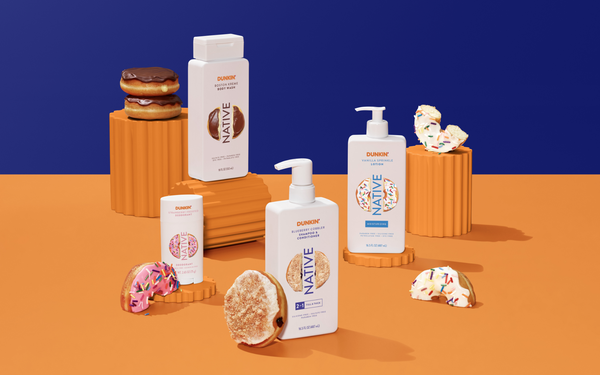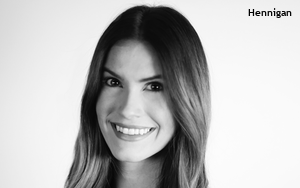
With the fragrance
world approaching peak vanilla, mass brands are inevitably looking for new ways to sweeten consumers’ personal care. Procter & Gamble’s Native recently debuted a Dunkin Donut collab,
exclusively at Walmart, and a fruity partnership with Jarritos, the Mexican soft drink brand, only sold in Target. Unilever is selling the Dove X Crumbl collection, also at Walmart.
The love
for sweets spans price points, from the high -- vanilla is a significant component of new fragrance launches last year from Dolce & Gabbana, Lancôme, and Bottega Veneta -- to the low, with
Axe’s Fine Black Vanilla. Clare Hennigan, senior beauty analyst at Mintel, explains what’s driving the “I want to smell good enough to eat” frenzy.
Interview
has been edited for length and clarity.
advertisement
advertisement
Marketing Daily: On the surface, these Dove and Native collabs seem silly. Do people want armpits that smell like donuts? Is there anything
deeper to these deals than bringing a little novelty to the shelf?
Clare Hennigan: Yes, it is deeper. The fragrance industry has been so hot in 2024, and every indicator is that 2025
will be, too. Consumers are considering what fragrances they're wearing, and the scent is becoming so closely linked with identity and mood. Consumers are eager to experiment. And linking fragrance
with food is a trend we’ve seen throughout the years. Food is comforting and nostalgic. Right now, the gourmand trend is big, with Mugler and Sol de Janeiro cited as some of the first.
So, it makes sense that personal care would follow, trying to get people thinking of food-inspired fragrances.
Cross-collaborations enhance the appeal of limited-edition products, with 10%
of U.S. adults purchasing a beauty/grooming product on impulse because it was a brand collaboration. Among people 18 to 44, that rises to 16%.
Marketing Daily: Is that enough to
boost sales in the whole category?
Hennigan: The personal care sector is poised for consistent growth, largely fueled by innovations that align with consumer interests in skin health,
fragrance, and effectiveness. Over a fifth of consumers in body care, antiperspirants, and deodorants are paying more attention to their purchases than a year ago. Personal care is a resilient
category, and people have come to regard personal care products as an important part of self-care.
Marketing Daily: Are people using these yummy-smelling products as stand-alone
fragrances? Or layering them on other scents?

Hennigan: Layering depends on who the consumer is.
Certainly, some are saying, “I want to smell like a sweet shop,” and they want to experiment with all the layering how-to videos they’ve seen on TikTok. They’re piling on body
wash smells and moisturizer scents, topping all that off with a fragrance, and then sharing those cocktail recipes. They’re looking to craft a unique, strong, cohesive scent.
Our
research finds that about 26% of adults who have used a fragrance and/or scented personal care product say that they intentionally like to layer them with other products and fragrances, often to make
the scent last longer.
But some purists will use unscented everything, so their signature fragrance remains undiluted.
And many people do have a signature scent, with 34% of consumers
telling us they typically wear it. That climbs to 41% when we look at adults aged 18 to 24.
Marketing Daily: Traditionally, fine fragrance starts a trend, which filters down to mass
brands. Could the trend go the other way? Will we see Chanel launch a vanilla cupcake scent?
Hennigan: I would never say never! We saw Tom Ford launch Vanilla Sex in 2023, and it has
had Lost Cherry for some time. D.S. & Durga and Kayali both have big new hits with pistachio-inspired fragrances, and they’re getting a lot of buzz online. Consumers are talking about them
and going into stores for samples. So yes, we’ll see the gourmand trend continue. I expect we’ll soon see more tea scents and rice scents, and maybe those will lead to more mass
collaborations that are a step outside the dessert realm.
We might also see more high-end brands partner with mass ones. Some years ago, Byredo teamed up with Ikea. Collabs are a good way for
premium brands to connect with a broader universe of buyers.
Marketing Daily: Is the market for these primarily Gen Z women?
Hennigan: Yes, this generally appeals to
younger consumers, but we're seeing younger men dip their toe into fragrance much more than we have in the past. I’m a millennial, so I remember all the boys wearing Axe when I was growing up,
but Gen Z and Gen Alpha boys have many more options, like Le Labo and Creed.